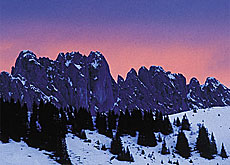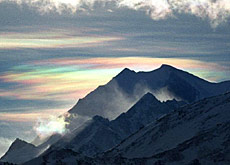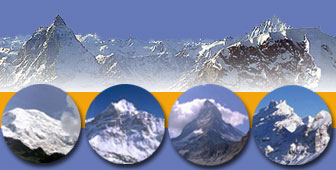Swiss take stock of Year of Mountains

Switzerland has been hailing the success of the International Year of Mountains, which wraps up on December 31.
But non-governmental organisations have criticised the Swiss government for not doing enough to protect mountain communities and their environment.
At a press conference in Bern this week, speakers from regional and national politics outlined what had been achieved over the past 12 months.
Remo Gautschi, of the Swiss Agency for Development and Cooperation (SDC), said the event had helped to boost awareness of the urgent need to protect mountain regions – and those who inhabit them – both at home and around the world.
Creating awareness
“Building up awareness that mountainous regions are special is globally very important…and has been one of the biggest achievements of the Year of the Mountains,” Gautschi told swissinfo.
The world’s mountainous regions – which account for approximately a quarter of the Earth’s surface – are estimated to be home to around one tenth of the world’s population.
Switzerland’s main contribution to a series of international mountain events during 2002 was the launch of an informal alliance of Alpine countries and private sector and non-governmental organisations, which share an interest in the concept of sustainable development in the mountains.
Gautschi said Switzerland had also supported a variety of pilot development projects in certain mountainous parts of the world, including central Asia, the Himalayas and the Andes.
“Concrete projects included an eco-tourism scheme in Kyrgyzstan and [building up] small-scale handicraft industries in other mountainous areas, where for the first time people in the mountains have become aware that they can produce and sell something,” Gautschi explained.
“So these are the kind of seeds we have planted for the future.”
Closer to home
Madeleine Bolliger, a member of the Swiss Coalition of Development Organisations, welcomes the role Switzerland has played in promoting policies of sustainable development in the mountains on a global level, but questions the commitment of the government to implement them at home.
“Switzerland is a pioneer nation at the international level,” Bolliger says. “But the problem is that when it comes to acting at a national level, our country loses credibility far too often.
“I think the mountains are a very good example because Switzerland pushed the topic at the international level – but it still has a lot to do at home and the Swiss government has yet to assume a leading role,” she adds.
Bolliger points to the fact that Switzerland is keen to tout its credentials internationally as a mountainous country, but has so far failed to ratify the protocols of a 1991 Alpine Convention signed with France, Italy and Austria.
Long-term commitment
But those in charge of coordinating sustainable development programmes in Switzerland’s mountains – from initiatives to halt the melting of glaciers to schemes to protect the livelihood of isolated mountain communities – say the success or failure of Swiss efforts should not be judged solely by ticking off a list of completed projects.
Pierre-Alain Rumley, director of the Federal Office for Spatial Development – the Swiss government’s coordination platform for national policies of sustainable development – says it will be up to future generations to take stock of the past 12 months.
“It’s difficult to say how successful it has been. Take for example the Year of Nature back in 1970. You didn’t have many projects at the time, but there were a lot of activities in the years which followed.”
“In the same way, it was important for us [in 2002] to make people more sensitive to the problems in the mountains, and the next stage will be the action.”
In a bid to educate a new generation of young Swiss about mountain eco-systems, schools were issued at the start of the year with a month-by-month calendar guide to 12 different aspects of sustainable development in the mountains.
From mountains to water
Swiss organisers of the International Year of Mountains say they are convinced that concrete action plans will follow as more and more people become aware of the fragility of mountain eco-systems.
Remo Gautschi denies that mountains will be forgotten as 2002 draws to a close, saying they will continue to be part of international discussions during the upcoming International Year of Freshwater in 2003.
Official estimates suggest that half of mankind’s freshwater supply originates in the mountains.
“With the International Year of Freshwater, we have a logical continuation of the Year of the Mountains, and we will make every effort to combine the two themes and to put the theme of water into the context of mountains.”
swissinfo, Ramsey Zarifeh
2002 was officially designated by the United Nations as the International Year of the Mountains.
Switzerland used the 2002 Earth Summit in Johannesburg to launch a mountain partnership initiative in a bid to encourage countries with mountainous regions to work together.
The Swiss government says it hopes to play an active role during the 2003 International Year of Water.

In compliance with the JTI standards
More: SWI swissinfo.ch certified by the Journalism Trust Initiative


You can find an overview of ongoing debates with our journalists here. Please join us!
If you want to start a conversation about a topic raised in this article or want to report factual errors, email us at english@swissinfo.ch.